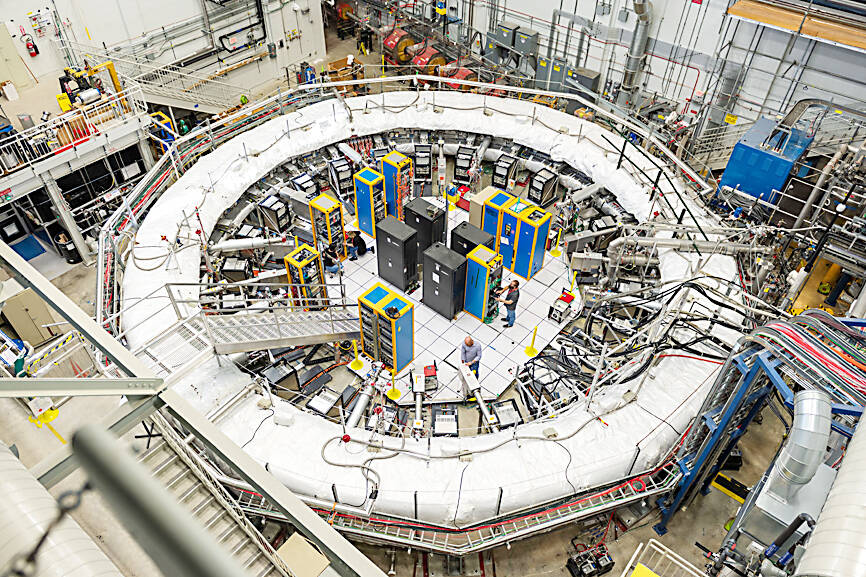The peculiar wobble of a subatomic particle called a muon in a US laboratory experiment is making scientists increasingly suspect they are missing something in their understanding of physics — perhaps some unknown particle or force.
Researchers on Thursday announced new findings about the muon, a magnetic and negatively charged particle similar to its cousin the electron, but 200 times more massive, in their experiment at the US Department of Energy’s Fermi National Accelerator Laboratory in Batavia, Illinois.
The experiment studied the wobble of muons as they traveled through a magnetic field. The muon, like the electron, has a tiny internal magnet that causes it to wobble — or, technically speaking, “precess” — like the axis of a spinning top while in a magnetic field, but the wobble’s speed, as measured in the experiment, varied considerably from what was predicted based on the Standard Model of particle physics, the theory that explains how the basic building blocks of matter interact, governed by four fundamental forces in the universe.

Photo: Reuters
The new findings, building on data released in 2021, continue to hint at some mysterious factor at play as the researchers try to sort out the discrepancy between the theoretical prediction and the actual experimental results.
“We are looking for an indication that the muon is interacting with something that we do not know about. It could be anything: new particles, new forces, new dimensions, new features of space-time, anything,” said Brendan Casey, a senior scientist at Fermilab and one of the authors of a research paper on the findings published in the journal Physical Review Letters.
“Yes, it is fair to say that it could be pointing to unknown particles or forces,” University College London physicist and study coauthor Rebecca Chislett said. “Currently due to new results in the theory community, it is difficult to say exactly what the discrepancy between the two [predicted muon behavior and observed behavior] is, but theorists are working hard to resolve this.”
The experiment was conducted at minus-268°C. The researchers shot beams of muons into a doughnut-shaped superconducting magnetic storage ring 15m in diameter. As the muons zipped around the ring traveling nearly at the speed of light, they interacted with other subatomic particles that, like tiny dance partners, altered their wobble.
The 2021 results similarly showed an anomalous wobble. The new results were based on quadruple the amount of data, bolstering confidence in the findings.
“With all this new knowledge, the result still agrees with the previous results and this is hugely exciting,” Chislett said.
The researchers hope to announce their final findings using all of their collected data in about two years.

‘TERRORIST ATTACK’: The convoy of Brigadier General Hamdi Shukri resulted in the ‘martyrdom of five of our armed forces,’ the Presidential Leadership Council said A blast targeting the convoy of a Saudi Arabian-backed armed group killed five in Yemen’s southern city of Aden and injured the commander of the government-allied unit, officials said on Wednesday. “The treacherous terrorist attack targeting the convoy of Brigadier General Hamdi Shukri, commander of the Second Giants Brigade, resulted in the martyrdom of five of our armed forces heroes and the injury of three others,” Yemen’s Saudi Arabia-backed Presidential Leadership Council said in a statement published by Yemeni news agency Saba. A security source told reporters that a car bomb on the side of the road in the Ja’awla area in

PRECARIOUS RELATIONS: Commentators in Saudi Arabia accuse the UAE of growing too bold, backing forces at odds with Saudi interests in various conflicts A Saudi Arabian media campaign targeting the United Arab Emirates (UAE) has deepened the Gulf’s worst row in years, stoking fears of a damaging fall-out in the financial heart of the Middle East. Fiery accusations of rights abuses and betrayal have circulated for weeks in state-run and social media after a brief conflict in Yemen, where Saudi airstrikes quelled an offensive by UAE-backed separatists. The United Arab Emirates is “investing in chaos and supporting secessionists” from Libya to Yemen and the Horn of Africa, Saudi Arabia’s al-Ekhbariya TV charged in a report this week. Such invective has been unheard of

US President Donald Trump on Saturday warned Canada that if it concludes a trade deal with China, he would impose a 100 percent tariff on all goods coming over the border. Relations between the US and its northern neighbor have been rocky since Trump returned to the White House a year ago, with spats over trade and Canadian Prime Minister Mark Carney decrying a “rupture” in the US-led global order. During a visit to Beijing earlier this month, Carney hailed a “new strategic partnership” with China that resulted in a “preliminary, but landmark trade agreement” to reduce tariffs — but

SCAM CLAMPDOWN: About 130 South Korean scam suspects have been sent home since October last year, and 60 more are still waiting for repatriation Dozens of South Koreans allegedly involved in online scams in Cambodia were yesterday returned to South Korea to face investigations in what was the largest group repatriation of Korean criminal suspects from abroad. The 73 South Korean suspects allegedly scammed fellow Koreans out of 48.6 billion won (US$33 million), South Korea said. Upon arrival in South Korea’s Incheon International Airport aboard a chartered plane, the suspects — 65 men and eight women — were sent to police stations. Local TV footage showed the suspects, in handcuffs and wearing masks, being escorted by police officers and boarding buses. They were among about 260 South